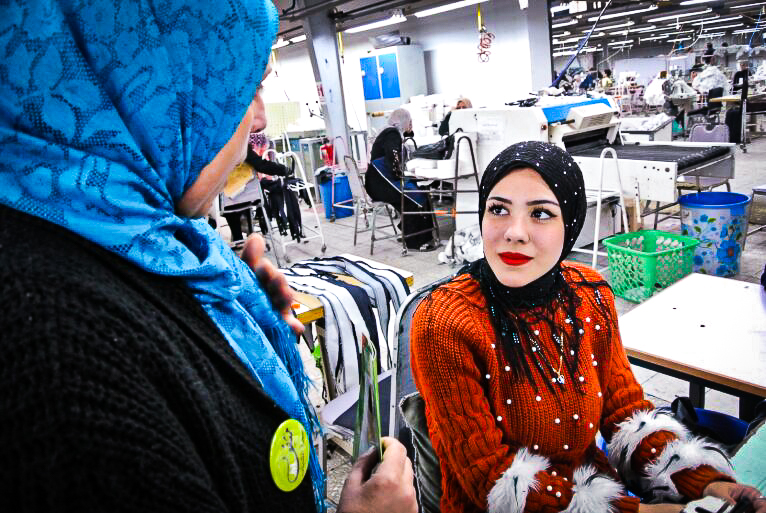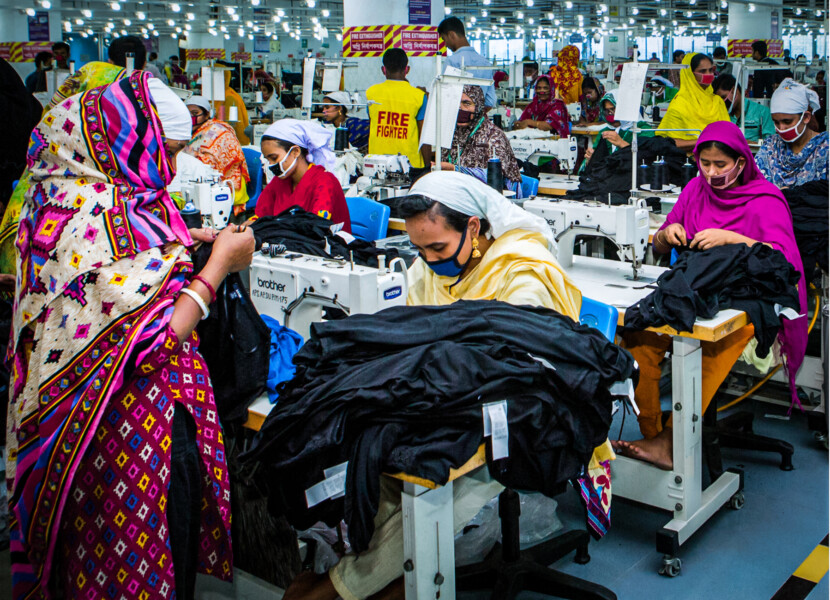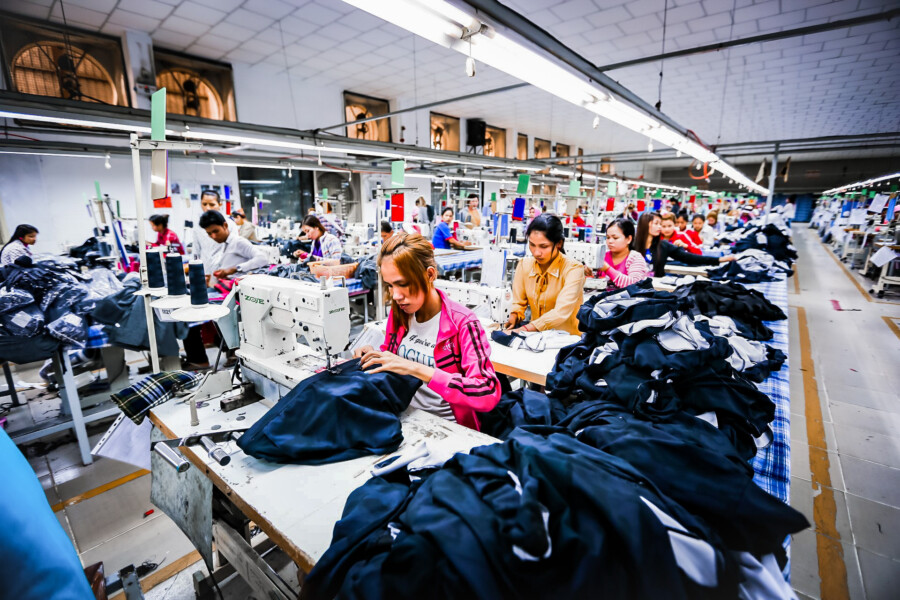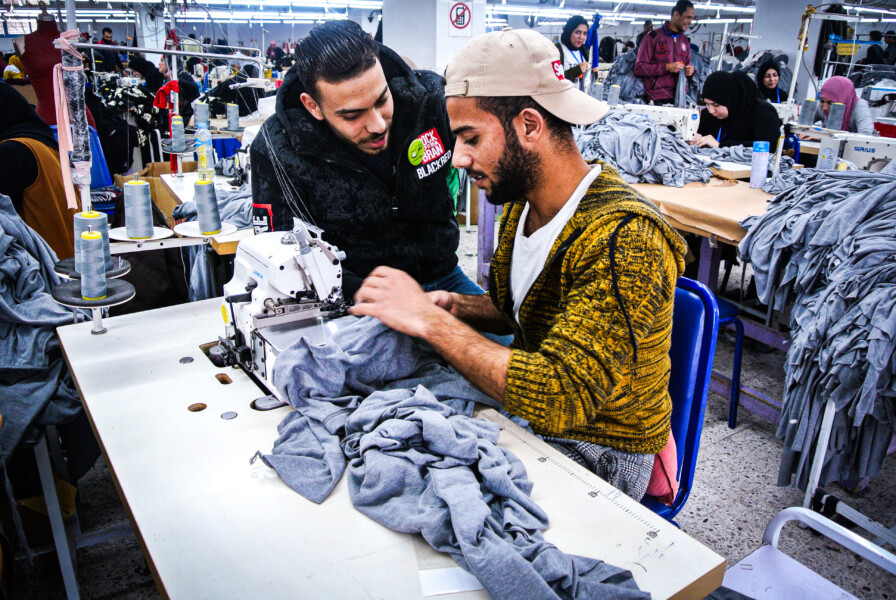
Globally, the garment industry employs nearly 94 million workers and more than 70 percent of them are women. Predominately, garment factory workers who are in their reproductive years come from rural areas and earn relatively low wages. Many of those workers have family planning needs that often go unmet due to workers’ long work hours, long commutes, and limited financial resources. Although many international companies introduced programs to improve the health and well-being of garment factory workers, those programs seldom address workers’ family planning needs.
Between 2015 and 2021, the Population Council-led Evidence Project, funded by the US Agency for International Development (USAID), used implementation science to promote and scale up access to counseling and voluntary family planning services among garment factory workers in three countries: Bangladesh, Cambodia, and Egypt.
Factory Workers in Bangladesh, Photo credit: Business for Social Responsibility (BSR)
In Bangladesh, the Evidence Project served as an evaluation partner for Business for Social Responsibility’s (BSR) HERproject. HERprojectRISE (Reimagining Industry to Support Equality) initiative, deployed peer health educators (PHEs) to disseminate health messaging on family planning and other health-related topics through informal sessions with factory workers. Additionally, the capacity of the on–site factory clinics was strengthened by increasing stocks of contraceptives and feminine hygiene products. The Council’s evaluation revealed that coupling PHE messaging with on-site provision of family planning and reproductive health services at factory clinics significantly improved behavioral outcomes such as the proportion of women who reported using any family planning methods in intervention factories.
Garment Factory in Cambodia, Photo Credit: Ashish Bajracharya
In Cambodia, between 2015 and 2017, the Evidence Project co-led WorkerHealth, an initiative to increase female garment factory workers’ access to and utilization of high-quality reproductive health and voluntary family planning services, in partnership with Marie Stopes International’s Support for International Family Planning and Health Organizations 2 (SIFPO2). The project adopted a “WorkerHealth champion” model and used mobile health (mHealth) strategies to reach over 40,000 workers in 35 factories with mobile health text messages and improve the referral process at the factories. The project’s combination of advocacy efforts with service delivery led to higher uptake of family planning and reproductive health services among female factory workers. Furthermore, with assistance from various stakeholders such as the Ministry of Labor and Vocational Training of the Government of Cambodia and the leading global apparel brand H&M, the WorkerHealth project translated the evidence generated by the initiative to inform policies and programs for promoting garment factory workers’ health in Cambodia.
Factory Workers in Egypt, Photo Credit: Heba El Kalaawy
In Egypt, between 2017 and 2020, the Evidence Project tested an intervention to increase demand for family planning among garment factory workers in the Investment Zone in Port Said. Male and female workers, aged 18-35, received family planning and reproductive health information through PHEs, educational materials, and social media. The intervention referred those interested in family planning use to a network of private physicians and pharmacists who had been trained by the Evidence Project. Although results from the evaluation showed that the intervention had no measurable effect on workers’ knowledge, attitudes, or behaviors, the evaluation identified several implementation issues such as low PHE to worker ratio, time constraints limiting PHEs’ ability to convey face-to-face messages to workers, and private sector providers charging high fees.
Building on what we learned from the initiative in Port Said, the Population Council Egypt is currently testing the feasibility, acceptability, and effectiveness of an intervention that combines raising awareness of family planning and reproductive health information and on-site provision of family planning services in 10 garment factories in El-Amereya Industrial Zone in Alexandria. Trained male and female PHEs provide family planning messages to their coworkers through face-to-face communication, social and behavior change communication materials, and WhatsApp. Family planning services are provided on site, free of charge, through mobile clinics that are operated by the Ministry of Health and Population. During our monitoring visits, we observed a tremendous demand for family planning services as a large number of factory workers sought services from the mobile clinic.
Key Takeaways
- On-site workplace peer health education models, especially those augmented by social media and other communication materials, can address family planning and reproductive health information needs of workers.
- Buy-in of the factory’s management is essential to ensure effective implementation of the intervention and its sustainability beyond the life of the project.
- Beyond awareness raising, on-site provision of affordable family planning and reproductive health services is crucial to overcome barriers to access to services among factory workers.
- Research that demonstrates the “return on investment” from integrating family planning information and services into workers’ health programs could help in persuading business owners to invest human and financial resources into those programs.



